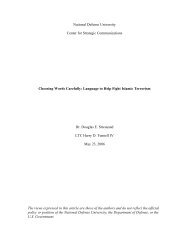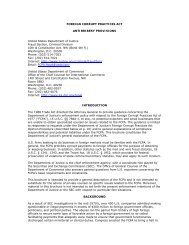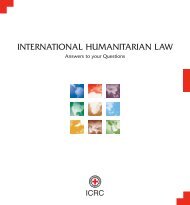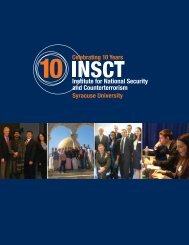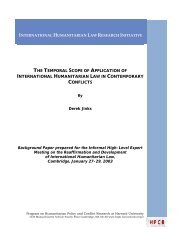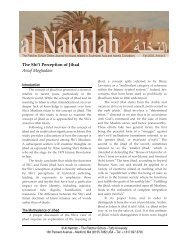some reflection on post-enlightenment qur'anic hermeneutics
some reflection on post-enlightenment qur'anic hermeneutics
some reflection on post-enlightenment qur'anic hermeneutics
Create successful ePaper yourself
Turn your PDF publications into a flip-book with our unique Google optimized e-Paper software.
Special] Post-Enlightenment Qur’anic Hermeneutics 1441quires a methodology that takes the history and c<strong>on</strong>temporary circumstancesinto account when arriving at a sound understanding of the meaning of thetext. Pure textualism or an effort discern the seventh-century law-giver’sintent, best exemplified by the can<strong>on</strong>ical tafsir, are of little service to Muslimswhen they must c<strong>on</strong>fr<strong>on</strong>t these modern and <strong>post</strong>-modern situati<strong>on</strong>s.The use of Islamic history and c<strong>on</strong>textual analysis in an effective and realisticway will enable the interpreter to avoid projecting his or her own prejudices<strong>on</strong>to the text. It will also enable the interpreter to use the history to hisor her best advantage to arrive at the result that is c<strong>on</strong>templated by the textand by the lawgiver. 156CONCLUSIONQur’anic <strong>hermeneutics</strong> is an important comp<strong>on</strong>ent of Islamic scholarshipand of central importance in making the Islamic texts relevant andmeaningful for c<strong>on</strong>temporary Muslims and for n<strong>on</strong>-Muslims seeking to understandIslam and their fellow citizens who are members of the Islamiccommunity. The hermeneutic of the Qur’an suffers from a number of inwhoadopt a ‘C<strong>on</strong>textualist’ approach to the interpretati<strong>on</strong> of the Qur’an c<strong>on</strong>sider that it isimportant to interpret the Qur’an by taking into account the socio-historical c<strong>on</strong>text of seventhcentury Arabia as well as the c<strong>on</strong>temporary c<strong>on</strong>text of Muslims today.” Id. at 159 n.4.See also RAHMAN, supra note 45, at 3-10; FARID ESACK, QUR’AN, LIBERATION ANDPLURALISM: AN ISLAMIC PERSPECTIVE OF INTERRELIGIOUS SOLIDARITY AGAINST OPPRESSION49-81 (1997). He c<strong>on</strong>tinues:While the traditi<strong>on</strong>al Muslim understanding of revelati<strong>on</strong> holds the Qur’an is theWord of God and not of Prophet Muhammad, it also holds that the language of theQur’an, Arabic, is a human language, deeply imbedded in human life. Despite attemptsby early Muslim theologians to separate the ‘revelati<strong>on</strong>’ from the mundaneby emphasizing its existence <strong>on</strong> the ‘Preserved Tablet’ (al-lawh al-mahfuz), theunderstanding of revelati<strong>on</strong> and the revelati<strong>on</strong> itself are firmly grounded in humanexperience, in the time, place and circumstances of the seventh-century Hijaz inArabia. The Qur’an is in the language of Mecca and surrounding regi<strong>on</strong>s, and itsc<strong>on</strong>cerns often were directed or indirectly c<strong>on</strong>nected to the Prophet and his community.In the Qur’an, references are made to the Prophet’s relati<strong>on</strong>ship to thepeople around him and the resp<strong>on</strong>se of his people to his message. The indifferenceof the people of Mecca to the poor and the needy is also highlighted. The revelati<strong>on</strong>included instructi<strong>on</strong>s to the people to act up<strong>on</strong> or refrain from certain things.It provided stories of earlier prophets and their peoples as a less<strong>on</strong> to the Prophet’sc<strong>on</strong>temporaries. The Qur’an refers repeatedly to the places, times, customs, norms,beliefs, values, ideas, instituti<strong>on</strong>s, practices, and attitudes of the people surroundingthe Prophet.Id. at 27-28.156. See, for example, William N. Eskridge, Jr., Gadamer/Statutory Interpretati<strong>on</strong>,90 COLUM. L. REV. 609, 644-45 (1990) for an interesting and provocative attempt to applythe Gadamerian approach to interpretati<strong>on</strong> to an immigrati<strong>on</strong> statute authorizing exclusi<strong>on</strong> ofan alien for engaging in homosexual acts. Professor Eskridge’s analysis has also been helpfulto me in applying the Gadamerian/Rahman approach to the Qur’an.



